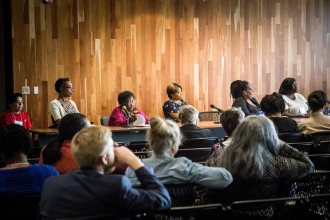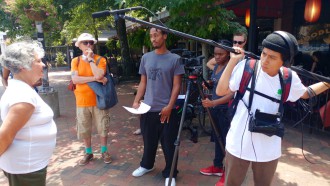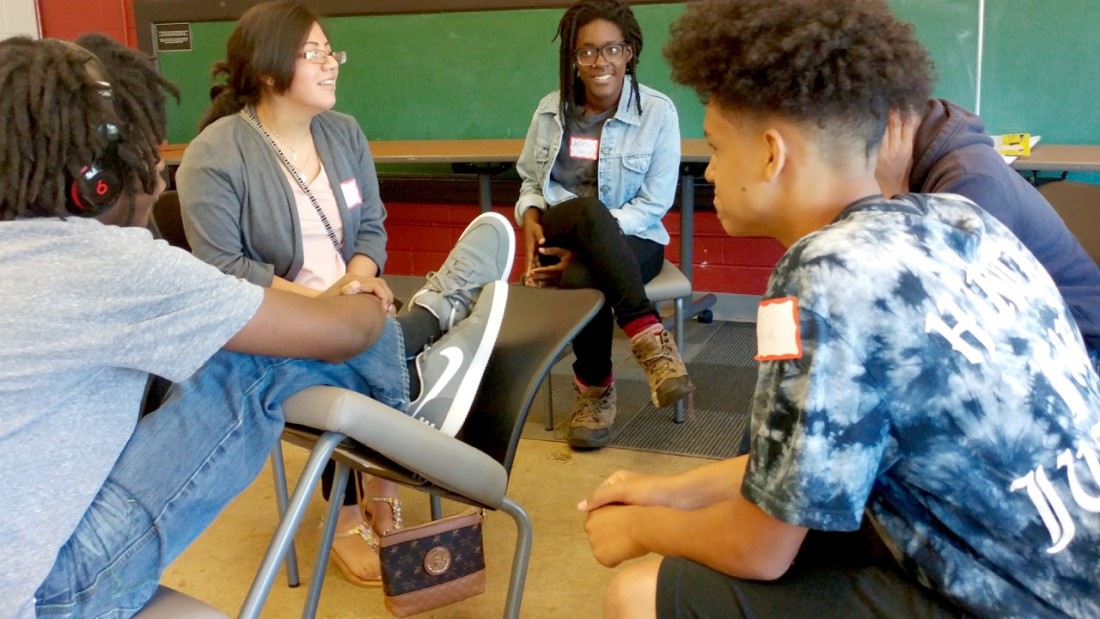The disparity between white and black residents of Buncombe County is stark.
Black babies are two times more likely to be born premature and 3.1 times more likely to die before their first birthday. On average, about 35 percent of black students in grades third through eighth are reading at grade-level proficiency, compared to 71 percent of white students. The percentage of the total population living below the poverty line is 33.9 percent among blacks and 14.5 percent among whites.

“There are staggering differences in outcomes for people depending on their race,” says Rachael Nygaard, director of strategic partnerships with Buncombe County. “What we know is that programs and services alone are not enough, that health and safety and well-being — those things that need to be in place for people and neighborhoods to thrive and be resilient — those foundational elements are culturally created, not professionally prescribed.”
Officials with Buncombe County believe the new grants, called Isaac Coleman Economic Community Investment Grants after the late local social justice advocate Isaac Coleman, offer a way to foster these culturally created values by focusing on smaller, community-based organizations.
“Buncombe County has funded community work for a long time and partnered with community organizations in a lot of different ways, but many of the partners that we’re engaging with through Isaac Coleman are not sort of your traditional, institutional nonprofit organizations,” Nygaard says. “Maybe they’re newer, maybe they’re still in a formative stage and don’t have a nonprofit in place yet.”
The program’s first round of funding was administered this year with the county awarding a total of $635,426 split among seven grassroots organizations.
Speaking youth to power
Word on the Street, a bilingual online magazine, showcases journalism and multimedia projects completed by local high school students. It offers a paid internship for the students, who fill the magazine’s website with poems, short editorials, articles and video projects.
“It’s based on their interests,” says Tamiko Murray, co-director of Asheville Writers in the Schools & Community who oversees Word on the Street. “They can learn web design or they can learn writing and editing or they can learn documentary film — that kind of stuff.”
In its second year, students participating in the program work on the magazine during the summer and meet weekly during the school year. And with the aid of the Isaac Coleman grant, officials will be able to enroll more students, jumping from 19 last year to a maximum of 25 this year. Murray says the money will help pay for a second youth coordinator and an additional staffer to assist with marketing and development.
Asheville Writers in the Schools & Community, which serves as an outlet for youths to express themselves through art and writing, is one of three organizations that will benefit from a $116,435 grant issued by the county, along with the My Community Matters Empowerment Program and Positive Changes Youth Ministries.
My Community Matters hosts a camp over the summer that teaches life skills to young people, and Positive Changes Youth Ministries is focused in part on supporting career readiness and promoting higher education. All three organizations are based out of the Arthur R. Edington Education and Career Center in Asheville.
“Through our collaboration, we’re working to create a pipeline toward opportunity — college education, career readiness, etc.,” Murray says.

Students who participate in one program often participate in another, and Murray sees many opportunities for the three organizations to bolster each other’s work. “One of our goals is to provide this kind of wraparound support for the youths that we work with,” Murray says.
The largest allotment of funding from the county — $125,000 — went to the Shiloh Community Association. Part of the funding will go toward a garden program coordinator to oversee events held in the neighborhood’s community garden. It will also boost matching savings for students in the association’s stipend program, which teaches young people personal finance skills such as saving money, writing receipts and other business-related activities. Students who participate in the program can use the stipend for future education.
The grant money will also facilitate the Pearson Plan, an initiative coordinated by the Shiloh, East End and Burton Street neighborhoods to promote cooperation and shared economic development. It’s a way to “see how we can enhance one another and help each other,” says Norma Baynes, an assistant liaison for the Shiloh Community Association.
Grant snapshots
Five other organizations received funding through the Isaac Coleman Economic Community Investment Grants, and they’ve made the following agreements with the city:
- $53,707 went to the Asheville Buncombe Institute of Parity Achievement, which will help the organization establish of a worker-owned home care cooperative that will “address the social determinants of health, specifically around education and economics,” according to the contract ABIPA signed with Buncombe County. Part of the group’s work includes planning opportunities and training that would lead to employment. Self-Help Credit Union and Mountain BizWorks will serve as partners on the project.
- $44,520 went to Buncombe County Schools as part of a partnership with the residents of the Deaverview neighborhood. The system will establish a family outreach coordinator, who will act as “a liaison for communication and support between the Deaverview neighborhood, Johnston Elementary School, the school system and other area groups,” according to the contract the system signed with the county. The system will also work to increase opportunities for parent engagement and establish stipends for volunteer opportunities.
- $71,460 went to CIMA, which will partner with the Emma Community Ownership Project to foster “dignified housing, meaningful education, sustainable employment, economic equity and civic engagement” in West Asheville’s Emma community. The community will hold classes about small businesses, organize a community legal clinic and develop a recorded history of the Emma neighborhood. The Emma Community Ownership Project will partner with Nuestro Centro as a co-recipient of Isaac Coleman grant funding. The funding will allow Nuestro Centro expand its RAICES program to include summer programming and more parent instruction.
- $111,804 went to United Community Development of North Carolina, which will develop an economic revitalization plan for the Southside community “focusing on businesses, jobs, affordable housing, arts, culture and using data to influence policy,” according to the organization’s contract with the city. It will also establish a business development training program and small-business incubator.
- $112,500 went to YTL Training Program to help provide summer and after-school programs for students that “provide access to mindfulness practices, academic tutoring, social skills building and artistic expression,” according to the organization’s contract. It will also provide programs for families about mindfulness, leadership, self-advocacy, connection to arts and culture, and job skills.
From the ground up
Of the 17 applications submitted to the county for funding, 12 were approved for a second phase of review. “That phase was more in-depth,” Nygaard says. “Me or other designated employees set up a phone conference with each of the groups to gather extra information.”
Officials in charge of reviewing the applications used a reference document that lays out criteria in six different categories that define strong applications. “Each of those pieces … was taken into consideration,” Nygaard says. “So if a group had strong partnerships and good ideas and was mobilizing people and also had a good design and outcomes that aligned with the project outcomes and had a sensible budget … those were the things that made those applications stand out.”
Of the amount awarded by Buncombe County, $500,000 was specifically allocated by the county, which was supplemented by additional funding totaling $135,426 that the county received through other grants. Nygaard says it’s too early to tell what the total funding pool will be for next year’s grant recipients, but the county intends to keep the program in place for at least three years.
All of the organizations that received funding through the Isaac Coleman grant program will also participate in the Isaac Coleman Learning Collaborative, a series of classes held monthly on topics that include budgeting and fundraising.
“Isaac Coleman is really focused on amplifying the talents and resources that exist indigenously within the different neighborhoods in our community,” says Lisa Eby, the county’s communications director. “It’s about taking what’s already happening and then building capacity and helping to connect resources and then really stepping back and letting it grow as it evolves within the neighborhoods.”
In essence, Eby says, the county is working toward greater community agency — “a sense that we can do great things when we come together.”
In addition to Isaac Coleman grant recipients, the collaborative is also open to organizations that didn’t receive grant funding through the program and groups that received Tipping Point Grants, smaller grants up to a maximum of $5,000 that are intended to help fledgling groups grow.
The Isaac Coleman Learning Collaborative offers a way for community members to build on their skills and develop peer networks, allowing them to expand their resources in the community. “I think efforts that grow from the inside of a community and involve community members in their own future and in designing how that’s going to be developed is inherently much more sustainable than things that are applied to communities,” Eby says.




Before you comment
The comments section is here to provide a platform for civil dialogue on the issues we face together as a local community. Xpress is committed to offering this platform for all voices, but when the tone of the discussion gets nasty or strays off topic, we believe many people choose not to participate. Xpress editors are determined to moderate comments to ensure a constructive interchange is maintained. All comments judged not to be in keeping with the spirit of civil discourse will be removed and repeat violators will be banned. See here for our terms of service. Thank you for being part of this effort to promote respectful discussion.